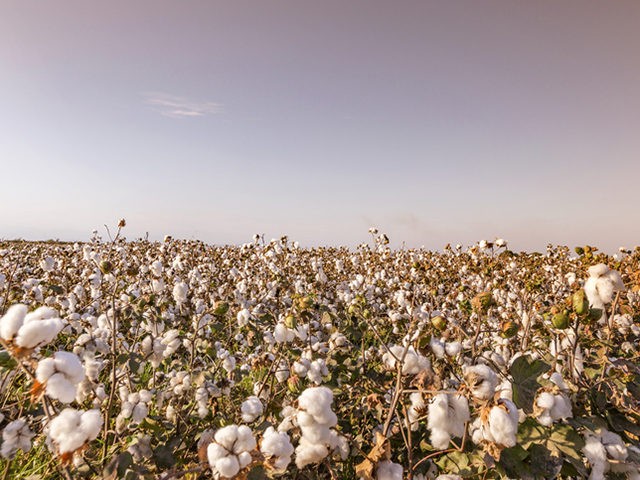Top Department of Homeland Security (DHS) officials on Wednesday announced new restrictions on cotton products from China suspected of being made from slave labor and warned Americans against buying products ‘Made in China’ this Christmas season.
“Our message today is ‘Shoppers beware.’ The ‘Made in China’ label is not just about the country of origin. It’s a warning label,” said acting Deputy Secretary of Homeland Security Ken Cuccinelli at a press conference Thursday.
“Those cheap cotton goods you may be buying for family and friends during this season of giving, if coming from China may have been made by slave labor in some of the most egregious human rights violations existing today in the modern world,” he said.
Cuccinelli announced that the Customs and Border Protection (CBP) was directing its personnel at all U.S. ports of entry to detain shipments containing cotton and cotton products sourced from the Xinjiang Production and Construction Corps (XPCC).
The XPCC is a Chinese paramilitary organization that U.S. officials allege uses slave labor from Uyghurs, a Muslim minority in China’s Xinjiang Uyghur Autonomous Region who are reportedly forced to live in camps.
“The captives of these camps are forced to make the kind of clothing, towels, sheets, blankets, yarn thread, and other cotton byproducts that find their way to the shelves of American stores in things like jeans, T-shirts, and socks, among other things,” Cuccinelli said.
“These are modern day slaves as Americans. We won’t participate in this views by buying goods made by labor at the point of a gun Americans of good conscience will stand up and refute,” he added.
The CBP’s Office of Trade directed the detainment of the products by issuing a Withhold Release Order (WRO), which acting CBP Commissioner Mark Morgan said will last until China until XPCC can show “definitely that they’re no longer using forced labor.”
Morgan said the WRO will affect a “massive amount” of cotton from China.
He said the XPCC — a “tool of the Chinese Communist Party” — employs an estimated 12 percent of Xinjiang’s population and generates 17 percent of its cotton heavy industry. “It’s a big company,” he said. “So you’re looking at potentially billions of dollars.”
Morgan said the U.S. has already detained “hundreds of shipments in excess of $50 million dollars” from previous enforcement actions against XPCC over the past year.
The WRO is the sixth enforcement action by the CBP in the past three months against goods made by slave labor in Xinjiang.
Morgan said not only is forced labor a “barbaric human rights violation,” but it introduces unfair competition in the global supply chains.
“Imports made with forced labor directly threatens the United States economy by forcing American businesses that respect human rights and fair labor standards to compete with entities that abuse workers to produce goods cheaply,” he said.
Sen. Marsha Blackburn (R-TN) thanked President Donald Trump for the new WRO:
“Thank you @realDonaldTrump for banning cotton produced by forced Uyghur labor. The U.S. will not support companies that profit off of slave labor.”
Thank you @realDonaldTrump for banning cotton produced by forced Uyghur labor. The U.S. will not support companies that profit off of slave labor.
— Sen. Marsha Blackburn (@MarshaBlackburn) December 3, 2020
Morgan said consumers, reporters, business owners, and others can also help combat forced labor by contacting CBP through its e-Allegations Online Trade Violation Reporting System, or by calling 1-800-BE-ALERT.
Follow Breitbart News’s Kristina Wong on Twitter or on Facebook.

COMMENTS
Please let us know if you're having issues with commenting.